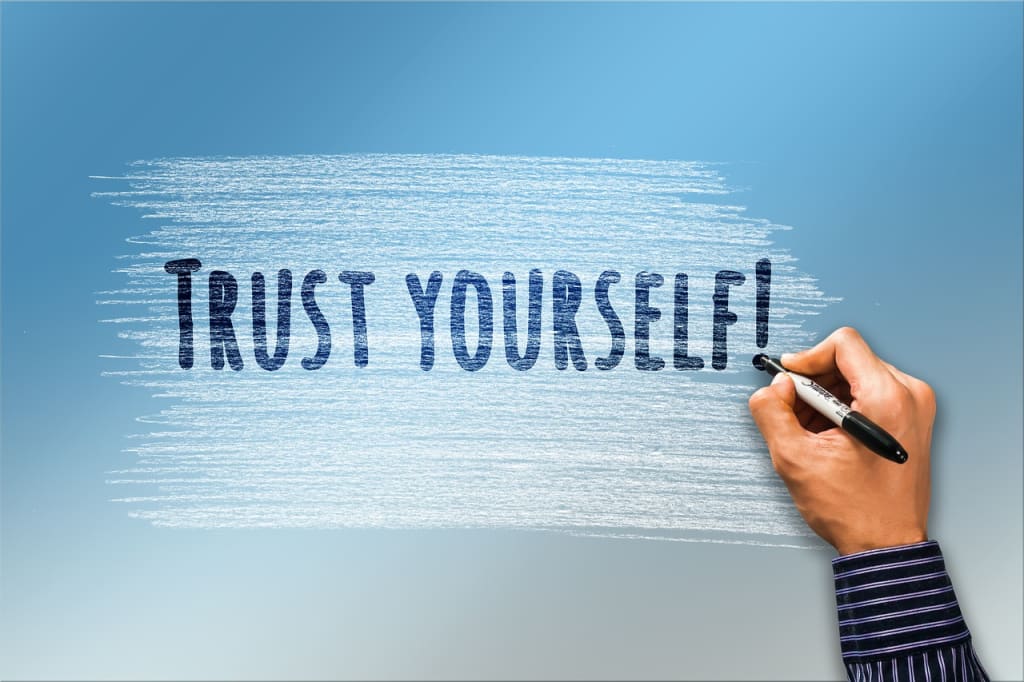
Becoming more confident can be a challenging process, but there are several things you can try that may help you build your confidence over time:
1. Set achievable goals for yourself and work towards them. Accomplishing small goals can help boost your confidence and give you a sense of accomplishment.
Here are some tips for setting achievable goals:
1. Make sure your goals are specific and measurable. Instead of setting a goal like "lose weight," try setting a goal like "lose 5 pounds in the next month." This makes it easier to track your progress and know when you've achieved your goal.
2. Set realistic goals. It's important to challenge yourself, but setting unrealistic goals can set you up for failure and discourage you. Make sure your goals are achievable given your current resources and circumstances.
3. Set time-bound goals. Giving yourself a deadline can help you stay motivated and focused on achieving your goal.
4. Break your goals down into smaller, more manageable tasks. This can make your goals feel less overwhelming and help you stay on track.
5. Write your goals down and review them regularly. This can help you stay accountable and focused on achieving your goals.
Remember that it's okay to adjust your goals as you go along. If you find that a goal is too difficult or not aligned with your priorities, it's okay to reassess and make changes as needed. The key is to stay focused and persistent in working towards your goals.
2. Practice self-affirmation and positive self-talk. Remind yourself of your strengths and capabilities, and try to avoid negative self-talk.
Here are some tips for Practice Self-affirmation:
Self-affirmation involves repeating positive statements to yourself in order to build self-confidence and reduce negative self-talk. Here are some tips for practicing self-affirmation:
1. Identify your values and strengths. Start by identifying your values and the things you are good at. These can be the foundation for your self-affirmations.
2. Write down your affirmations. Try to make your affirmations specific and personal to you. For example, instead of saying "I am confident," try saying "I am confident in my ability to learn new skills."
3. Practice your affirmations regularly. It's best to practice self-affirmation daily, but even a few times a week can be helpful. Try repeating your affirmations to yourself in the morning, before bed, or whenever you are feeling low.
4. Use positive language. Avoid using negative words like "not" or "can't." Instead, use positive language that affirms your strengths and capabilities.
5. Be patient. Building self-confidence and reducing negative self-talk can take time. Don't expect to see results overnight, and be patient with yourself as you work on building your confidence.
Remember that self-affirmation is just one tool in the journey to build confidence. It's important to also work on setting and achieving goals, taking care of your physical and emotional health, and seeking support when needed.
Here are some tips for Practice Self-talk:
Positive self-talk involves talking to yourself in a positive, supportive way, rather than engaging in negative self-talk. Here are some tips for practicing positive self-talk:
1. Notice when you are engaging in negative self-talk. Pay attention to the thoughts you have about yourself and your abilities. If you notice negative thoughts, try to reframe them into a more positive statement.
2. Use positive affirmations. Similar to self-affirmation, positive affirmations involve repeating positive statements to yourself. These can help you build self-confidence and counteract negative self-talk.
3. Be realistic. It's important to be honest with yourself, but also try to focus on the positive aspects of your abilities and accomplishments.
4. Practice gratitude. Focusing on the things you are grateful for can help shift your mindset to a more positive perspective.
5. Seek support. If you find it difficult to change your negative self-talk patterns on your own, consider seeking support from a therapist or other mental health professional.
Remember that positive self-talk is a skill that takes time and practice to develop. It's normal to have negative thoughts from time to time, but the key is to try to shift your mindset to a more positive perspective and practice self-compassion.
3. Take care of your physical health. Exercise, eat well, and get enough sleep. Taking care of your body can help you feel more confident and capable.
Here are some tips to take care of your Physical health:
Taking care of your physical health is an important aspect of overall well-being and can help you feel more confident and capable. Here are some tips for taking care of your physical health:
1. Exercise regularly. Aim for at least 150 minutes of moderate-intensity exercise or 75 minutes of vigorous-intensity exercise per week, as recommended by the Centers for Disease Control and Prevention (CDC). This can include activities like walking, running, swimming, or cycling.
2. Eat a balanced diet. Make sure to include a variety of fruits, vegetables, whole grains, and protein in your diet. Try to limit your intake of sugary drinks and unhealthy fats.
3. Get enough sleep. Adults should aim for 7-9 hours of sleep per night, according to the National Sleep Foundation. Not getting enough sleep can negatively impact your physical and mental health.
4. Stay hydrated. Aim to drink at least 8 cups (64 ounces) of water per day, or more if you are physically active or in a hot environment.
5. Avoid unhealthy behaviors. This can include things like smoking, excessive alcohol consumption, and using drugs. These behaviors can have negative impacts on your physical and mental health.
Remember that taking care of your physical health is a lifelong journey. It's okay to have setbacks or make mistakes, but the key is to make an effort to prioritize your health on a regular basis.
4. Learn new skills. Building new skills and knowledge can help you feel more confident in your abilities.
Here are some tips to learn new skills:
Learning new skills can be a great way to boost your confidence and improve your abilities. Here are some tips for learning new skills:
1. Identify the skill you want to learn. Start by identifying the specific skill you want to learn and why you want to learn it. This can help you stay motivated and focused on your goal.
2. Find resources to help you learn. There are many resources available to help you learn new skills, such as online courses, books, workshops, and in-person classes. Consider what type of resource works best for you and your learning style.
3. Create a plan for learning the skill. Break the skill down into smaller, more manageable tasks. This can help you stay on track and make progress towards your goal.
4. Practice regularly. It takes time and practice to learn a new skill, so make sure to set aside time to practice regularly.
5. Seek feedback and support. It can be helpful to seek feedback from others, such as a mentor or teacher, as you learn the skill. This can help you identify areas for improvement and stay motivated.
Remember that learning new skills is a journey, and it's okay to make mistakes and have setbacks along the way. The key is to stay persistent and focused on your goal.
5. Seek support from friends, family, or a therapist. Sometimes, talking through your insecurities and doubts with someone you trust can help you gain a new perspective and build your confidence.
6. Take risks and try new things. Stepping outside of your comfort zone can be scary, but it can also help you build confidence in your ability to handle new challenges.
Remember that confidence is something that can take time to build, and it's okay to have moments of self-doubt. The key is to work on building your confidence consistently over time.
About the Creator
Rudhra
I'm a Freelancer and Technical Support person which create contents on Nature and living lifestyle.





Comments
There are no comments for this story
Be the first to respond and start the conversation.